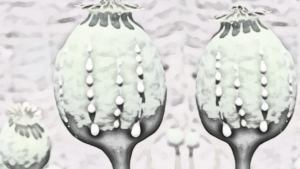Opium
Charged With an Opium Crime? Let Our New Jersey Drug Crimes Defense Attorneys Help You
If you have been charged with possession, distribution or trafficking of opium you are facing serious drug charges. Our New Jersey criminal defense lawyers will work hard to reduce the charges against you, or, if you are innocent, to have the charges dismissed.
For a free initial consultation contact an experienced opium drug crimes defense lawyer today.
Drug Information About Opium
Street names: Skee, Big O, Joy Plant, Chinese Tobacco, Dream Stick, Pen Yan, Dopium, Chandoo, Aunti
Drug classification: Opium is a Schedule II drug in the US under the Controlled Substances Act. It is illegal to posses without a valid license or prescription.
General Information
 Opium is the dried latex, or milky-white fluid, that is harvested from the poppy plant. Opium is a painkiller, containing natural concentrations of both morphine and codeine. Opium is therefore not a single chemical itself, but rather a natural combination of chemicals with synergistic effects. It is obtained from unripe seeds that are crushed – latex from other parts of the plant such as the stem or leaves will not produce nearly as nice of a product.
Opium is the dried latex, or milky-white fluid, that is harvested from the poppy plant. Opium is a painkiller, containing natural concentrations of both morphine and codeine. Opium is therefore not a single chemical itself, but rather a natural combination of chemicals with synergistic effects. It is obtained from unripe seeds that are crushed – latex from other parts of the plant such as the stem or leaves will not produce nearly as nice of a product.
Opium has an incredibly long history of human medical and recreational use, dating back to ancient China, ancient Egypt, Babylon, and even Mesopotamia. But the isolation of morphine and other subsequent painkilling chemicals caused a sharp reduction in global opium usage.
Doctors chose to use pure morphine rather than opium, since this allowed for specific dosing of patients and eliminated many safety risks associated with opium (problems of purity and accidental overdose.) The invention of the hypodermic needle also accelerated the use of drugs like heroin and morphine intravenously, decreasing the demand for less-potent opium that is smoked or consumed orally. Today most opium is processed into heroin, which is more potent and easier to transport.
The Effects of Opium
Opium exists as a black or brown tar-like substance. This is typically mixed into food or drink and consumed orally or smoked, often mixed with tobacco or marijuana. The effects of opium are typical of most opioid’s, and include euphoria, relaxation and a sense of well being, drowsiness, and sedation.
When smoked, the opiate chemicals are quickly absorbed through blood vessels in the lungs and get sent to the brain. This causes more of a rush of effects, making the onset of effects nearly immediate. Smoke from opium has a distinct taste and smell and is instantly recognizable. Orally consumed opium has to pass through the stomach and upper intestines before it can affect the brain. The process of digestion weakens the effects of opium since the drug has to pass through multiple organs in the body.
Side Effects of Opium
Side effects of opium usage include nausea, constipation, dry mouth, and confusion. These are typical of almost all opioids – nausea is a common side effect, and because opioids inhibit muscle movements in the bowels and the coughing reflex from the brain, constipation and dry mouth or irritated mucous membranes in the nose can result. Overdosing on opium can lead to slowed and even stopped breathing, risking death from respiratory depression. Opium should not be combined with other central nervous system depressants, such as alcohol, antihistamines, or benzodiazepines, as this may also slow the central nervous system to a dangerous level and risk fatal results.
Opium Abuse and Addiction
Opium is both highly physically and mentally addictive, and tolerance in the body develops rapidly, requiring the user to ingest more and more of the drug to reach the same effects. Withdrawal symptoms have been reported when heavy users of opium quit using. The most common symptom is intense cravings for opium, a result of the brain decreasing its production of pleasure-enhancing compounds in the presence of large quantities of opium.
Apart from depression, insomnia, and anxiety, other symptoms of withdrawal tend to resemble a bad case of the flu. Symptoms include nausea, diarrhea, muscle pain, cold sweats, runny nose, and involuntary muscle movement. Opium addiction and detox should be treated and observed at a medical center with professionals. Methadone or buprenorphine may be prescribed to help people wean themselves off of opium.
